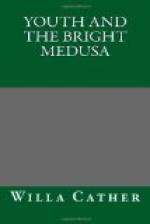The usual repertory of restaurant music followed, varied by a charming bit from Massenet’s “Manon,” then little known in this country. After we paid our check, Cressida took out one of her visiting cards and wrote across the top of it: "We thank you for the unusual music and the pleasure your playing has given us." She folded the card in the middle, and asked the waiter to give it to the director of the orchestra. Pausing at the door, while the porter dashed out to call a cab, we saw, in the wall mirror, a pair of wild black eyes following us quite despairingly from behind the palms at the other end of the room. Cressida observed as we went out that the young man was probably having a hard struggle. “He never got those clothes here, surely. They were probably made by a country tailor in some little town in Austria. He seemed wild enough to grab at anything, and was trying to make himself heard above the dishes, poor fellow. There are so many like him. I wish I could help them all! I didn’t quite have the courage to send him money. His smile, when he bowed to us, was not that of one who would take it, do you think?”
“No,” I admitted, “it wasn’t. He seemed to be pleading for recognition. I don’t think it was money he wanted.”
A week later I came upon some curious-looking manuscript songs on the piano in Cressida’s music room. The text was in some Slavic tongue with a French translation written underneath. Both the handwriting and the musical script were done in a manner experienced, even distinguished. I was looking at them when Cressida came in.
“Oh, yes!” she exclaimed. “I meant to ask you to try them over. Poppas thinks they are very interesting. They are from that young violinist, you remember,—the one we noticed in the restaurant that evening. He sent them with such a nice letter. His name is Blasius Bouchalka (Bou-kal-ka), a Bohemian.”
I sat down at the piano and busied myself with the manuscript, while Cressida dashed off necessary notes and wrote checks in a large square checkbook, six to a page. I supposed her immersed in sumptuary preoccupations when she suddenly looked over her shoulder and said, “Yes, that legend, Sarka, is the most interesting. Run it through a few times and I’ll try it over with you.”
There was another, “Dans les ombres des forets tristes”, which I thought quite as beautiful. They were fine songs; very individual, and each had that spontaneity which makes a song seem inevitable and, once for all, “done.” The accompaniments were difficult, but not unnecessarily so; they were free from fatuous ingenuity and fine writing.
“I wish he’d indicated his tempi a little more clearly,” I remarked as I finished Sarka for the third time. “It matters, because he really has something to say. An orchestral accompaniment would be better, I should think.”
“Yes, he sent the orchestral arrangement. Poppas has it. It works out beautifully,—so much colour in the instrumentation. The English horn comes in so effectively there,” she rose and indicated the passage, “just right with the voice. I’ve asked him to come next Sunday, so please be here if you can. I want to know what you think of him.”




